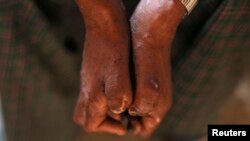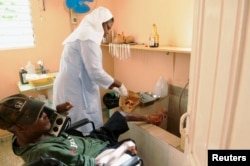Southern Malawi has seen a resurgence of leprosy, which was believed to have been stamped out in the country in 1970. The disease has been reported in five districts since 2011, including the capital, and the caseload continues to grow.
Malawi’s leprosy-free status does not mean the disease was ever totally eliminated. In 1994, the World Health Organization defined leprosy-free status as having less than one case per 10,000 people.
Increase in cases
So far this year, the government has registered new 629 cases, up from 554 cases in 2014.
Leonard Mawaya, program manager for the Department of Leprosy and Skin Diseases at the Ministry of Health, attributes the resurgence to complacency. He said people thought the disease was gone and funding was cut.
“Even the program’s office has got one vehicle catering for the whole country. So for us to do supervision from North down to South becomes very difficult. And for the rest of our officers, only one or two have got motor bicycles while the rest have to borrow,” Mawaya said.
Leprosy is far from the biblical plague it once was. The skin disease is caused by bacteria. It is infectious, transmitted via sneezing and coughing, but it is now treatable. The WHO recommends a multi-drug regimen that makes patients unable to transmit the infection after just one dose.
People in Malawi with the disease can receive outpatient care in all five affected districts.
Diagnosis carries stigma
One man, who asked that VOA not reveal his name for fear of being stigmatized, said he was diagnosed last August. He went to the hospital because he had a light patch on his skin that felt numb. He said the doctors put him on treatment right away and he has seen great improvement. But the diagnosis can still mean discrimination.
Patient Agnes Mbewe said people who know about her leprosy diagnosis are avoiding her because they say it is contagious and she may spread the disease. I feel sorry for myself, she said.
Without treatment, leprosy can be disfiguring and lead to complications like loss of feeling, permanent nerve damage and muscle weakness.
A Catholic parish in southern district of Balaka is providing food and shelter to 23 people severely disabled by leprosy.
Skin disease specialists met recently in Malawi. They said leprosy escalation can be contained within two years but to do so, an additional $16,000 in funding per month is needed.





